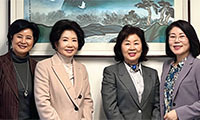’SILENT’ RESTAURANT WORKERS ARE LEARNING TO SPEAK UP
A bell jingles as I open the glass door to enter a LA Koreatown restaurant.
Immediately, a hot wind filled with pungent smells hits my nose. My stomach growls in response as memories associated with each smell come to my attention. They are the smells of birthdays, of church functions, of Korean food. I sit at a small wooden table as I glance through the menu, looking for that which would satisfy my hunger and give me comfort through the memory associated with it.
Several middle-aged Korean women, all wearing matching aprons and smiles, weave effortlessly through the tables, dishing out bubbling pots and silver bowls of rice. These women each have a story. Some are mothers; some are poor; some arrived at LAX a few months ago; some are single.
Mrs. Lee, a small, thirty-something mother, is one of the thousands of silent, invisible workers who have emerged from brutal working conditions to make her voice heard.
"When I talk about other things, I don’t have much to say," she begins. “But when I talk about the restaurants, there is just too much to talk about."
Mrs. Lee immigrated to America six years ago. In Korea, her husband worked as a computer programmer and she as a bank teller. Work was not a necessity for Mrs. Lee. Rather, she just liked her job and had worked there since she graduated high school. Combined, their incomes were more than enough to own a house and an office building. The couple even had enough income to invest in a building.
But then their investment failed and they lost some of what they owned. At the same time, Mrs. Lee’s husband was not promoted in his company because he did not have a doctorate degree. These factors made Mrs. Lee and her husband feel the need to start their lives over again. So with their two young children and $100,000 in savings, the Lee family left the safety of Korea for a brighter future in America.
Like so many immigrants before them, the Lee family came with their hopes, dreams and an idealistic view of America.
Believing their savings were sufficient, they lived in a modest apartment near Westwood in Los Angeles. Both Mrs. Lee and her husband hoped to attend school. At first, however, only her husband went to school while she stayed home, taking care of their children. Unaware of the high rent, Mrs. Lee let her husband take care of their finances. And one day to her shock there was no money left in their bank account. Reality hit her hard. She would have to look for a job.
For a Korean immigrant woman who did not speak any English, Koreatown was the only place she could go for work. But they were flat broke. There was not even enough gas in the car to get her there. So using her resources as a housewife, Mrs. Lee took all of the change she had collected from going to the market. With that, she went to the gas station and got just enough gas to get her to Koreatown and back. That was when she began working as a waitress.
The life of a waitress is difficult. Being on your feet for eight hours straight is hard enough. Add to that carrying hot dishes, dealing with drunk customers, and maintaining your composure. In comparison to "American" restaurants, however, working for a Korean restaurant is much more demanding.
Women there work 12 to 15 hours a day and only earn $1000 a month, including tips. And many, like Mrs. Lee, are recent immigrants and cannot afford looking for a job. They need money fast to pay next month’s rent.
For three years, Mrs. Lee lived this lifestyle. Working seven days a week, 15 hours a day, she was unable to witness her young children grow up. Every night she would come home at midnight, turn on the shower, and weep, rinsing out the ingrained smell of food while releasing her daily burdens.
Her only contact with her children consisted of watching them sleep and sending them off to school in the morning.
In time, the long hours and stressful working conditions caused a rift in her relationship with her husband. They would fight, but only when the children were not looking. "I took our big immigration bag and put my husband’s clothes in and took it out, put it in and took it out a number of times." It was inevitable that her oldest child, who was six at the time, began to notice. He bit his nails halfway off because of the stress.
In addition to emotional strain, Mrs. Lee’s job also took a physical toll on her life. On two occasions, her hand was severely burned. The first time, the skin between her fingers fused together and it was difficult to separate them. Her hand was then burned again, but this time, it swelled and inflated like a balloon. This was not a rare occurrence. Mrs. Lee recounted the story of another restaurant worker who was burned when soup spilled on her feet. Because she had to keep working, she continued to wear shoes and socks and did not let her feet heal completely. Today, this worker’s feet are still scarred and misshapen.
Mrs. Lee also experienced internal physical trauma. For several months, she exhibited physical ailments that seemed out of the ordinary. She spoke with her co-workers and since they too experienced the same symptoms, she thought nothing of it. Her co-workers then began visiting gynecologists and she decided to do the same just to be safe. She was informed that she was pregnant, but that the baby had died and she was only carrying its remains. She had to undergo surgery that very day to remove the baby. Mrs. Lee had no money to pay for the surgery, but because of the extreme urgency of her case, the doctor performed the operation for free.
All of these stories are not unusual for the lives of immigrant restaurant workers. Mrs. Lee also endured misshapen fingers and hurt backs from working in unsafe conditions. A crippling back injury, due to the restaurant’s slippery kitchen floor, prevented her from working for one and a half years. It was this injury, however, that eventually led to her partnership with the Korean Immigrant Workers Advocates (KIWA) based at 8th Street and Hobart Avenue in the heart of Koreatown.
At a KIWA labor law seminar held the year before, Mrs. Lee was introduced to the organization and also to the concept of American labor laws. There she learned about minimum wage, labor regulations, and worker’s compensation.
That seminar came to her memory when she was unable to pay for treatment for her injured back. She went to the restaurant where she used to work and asked her former employer to compensate her for her injury. The owner did not have insurance, however, and could not afford to pay for her treatment. He offered her $1,000 to simply forget about the incident.
Angered by her employer’s indifference, Mrs. Lee demanded to get paid for the time she could not work. He offered her an additional $600, but that was not enough for Mrs. Lee and her family to live on. She protested, but her employer simply said, "I have someone who can start work tomorrow. Just go."
KIWA was Mrs. Lee’s last hope. She turned to the 10-year-old labor advocacy group to receive treatment for her injury. But as far as her wages were concerned, Mrs. Lee could only wait for the government to intervene. It would be five to seven years before she saw any of the money she was due. So Mrs. Lee visited the KIWA office often to check on the status of her pending case.
Soon, she began to see other restaurant workers and hear their complaints. KIWA people realized the importance of her first-hand experience as a restaurant worker, and asked her to join the staff for three months as a part-time organizer. Initially, Mrs. Lee refused because she would receive only half the pay she would in a restaurant.
But looking back on the previous four years of her life in America, she realized that she missed out on raising her children. So she accepted the position and began working part-time at KIWA, not to save the world, but to take some time to rest and raise her children.
After the initial three months passed, everyday, she would leave the office no earlier than five or six o’clock, even though she was officially off the clock at two in the afternoon. "Even though this [restaurant workers] campaign is going on, the restaurant cases don’t decrease. There’s always a lot. But if it’s something I can do, I should do it." So KIWA asked her to stay as a full-time organizer for three more months and she agreed.
Today, Mrs. Lee is still a part of KIWA. Every day, restaurant workers come to the office with their stories and complaints. Mrs. Lee listens to their cases and works to resolve them. She also meets with workers on weekends to educate and organize them.
And while she is often pointed at on the street and even harassed by phone at home, Mrs. Lee continues to use her experience as a restaurant worker to improve the condition of workers, both Korean and Latino, in LA Koreatown. Because of the injustice she experienced, Mrs. Lee works to make her voice heard.
But these stories are not just hers. They are the stories of the hundreds of silent, exploited men and women working to provide us with a hot Korean meal. Fortunately, these wretched workers have at last found an advocate and a voice in Mrs. Lee and KIWA.
T. J. Anthony Lee is a UCLA student majoring in Asian American Studies and Political Science.
스마터리빙
more [ 건강]
[ 건강]이제 혈관 건강도 챙기자!
[현대해운]우리 눈에 보이지 않기 때문에 혈관 건강을 챙기는 것은 결코 쉽지 않은데요. 여러분은 혈관 건강을 유지하기 위해 어떤 노력을 하시나요?
 [ 건강]
[ 건강]내 몸이 건강해지는 과일궁합
 [ 라이프]
[ 라이프]벌레야 물럿거라! 천연 해충제 만들기
 [ 건강]
[ 건강]혈압 낮추는데 좋은 식품
[현대해운]혈관 건강은 주로 노화가 진행되면서 지켜야 할 문제라고 인식되어 왔습니다. 최근 생활 패턴과 식생활의 변화로 혈관의 노화 진행이 빨라지고
사람·사람들
more많이 본 기사
- 美, 1만5천 달러 비자 보증금 적용 국가 38개로 확대…베네수 포함
- 대법원, 9일 중대사건 판결…상호관세 운명 결정되나
- Ramen 아닌 Ramyeon…옥스퍼드사전에 K단어 2년 연속 올라
- 지역사회 AI데이터센터 반대 확산…중간선거 쟁점 조짐
- “작년 LA 산불지역 재건축 착수 주택 ⅓뿐…비용·절차 난항”
- 백악관 “트럼프, 그린란드획득 논의중…미군활용은 항상 선택지”
- ‘결혼 28년 차’ 오연수, ♥손지창과 행복한 줄 알았더니.. “걱정없는 집 없어”
- 트럼프, 與의원들에 “중간선거 꼭 이겨야…지면 탄핵소추당할것”
- [CES 2026] 젠슨황 “알파마요, 테슬라와 생태계 달라…곧 무개입 자율주행”
- 공화 현역 7선의원 별세…하원서 공화 ‘아슬아슬’ 다수당
- CES 2026 ‘통합 부산관’ 운영…13개 기업 혁신상 수상
- ‘안면 인식’으로 불체자 확인·체포한다
- “美, 베네수와 원유 수출방안 논의”…석유 제재 해제 수순 전망
- 메타, 디스플레이 스마트안경 글로벌 출시 연기…”재고 부족”
- “그동안 MLB 볼 판정 부정확→ABS 진작 필요했다” 美 CBS 냉철 분석
- [CES 2026] 젠슨 황 “메모리 공급부족 걱정안해…HBM4는 우리가 독점사용”
- [화제] 참치 한 마리에 ‘325만불’… 역대 최고가 경신
- 렌트 3% 상한시대… LA 주거정책 ‘대변혁’
- 故 안성기 장남인 미술가 안다빈, 아버지를 보내며..
- 뉴욕증시 연초 랠리 지속…다우지수 첫 49,000선 돌파 마감
- 李대통령, 상하이 임시정부 청사 방문…3박 4일 국빈방중 마무리
- “그린란드 일, 덴마크·그린란드가 결정”…유럽, 트럼프 견제구
- 폭우 후 기온 내려가 주말까지 맑고 쌀쌀
- [신년 집중기획/ 2026 새해 이렇게 바뀐다 - 주택] 아파트 냉장고 제공 ‘의무화’
- 항공 여행객 정보 ICE와 공유 “비시민권자 비행기 탑승시 주의”
- 트럼프 “마두로 체포작전 전술적으로 훌륭…쿠바병사 많이 죽어”
- [CES 2026] 10초 카운트다운에 환호성…전시장 개막부터 ‘북적’
- 美국무부 “이것은 우리의 반구”…서반구 장악 의지 노골화
- “물가와 상관없다” 더니… 트럼프, … 1
- 李대통령 방중기간 日제재 발표한 中…한미일 ‘갈라치기’ 시도?
- ‘1위 유튜버’ 미스터비스트, “뉴진스 도와달라” 요청에 남긴 한 마디
- TSA, 승객정보 ICE 공유 국내선 탑승자들도 체포
- 포드·GM, 작년 美신차판매 6%↑…도요타·현대차도 선전
- “위대한 인물” NYT, 故 안성기 부고 기사.. ‘장남’ 안다빈 공유
- 올해 VA 페어팩스 집값… “싱글홈 웃고 콘도는 글쎄”
- ‘親트럼프’ 연준이사 “금리가 경제 발목…올해 1%P 내려야”
- 송지우, 목욕탕서 팬과 아찔한 만남.. “나체로 라이브 감행”[우발라디오]
- 75세 박원숙, 분장실서 쓰러졌다 “쉬어야 한다는 자각 못해”
- 빛 잃은 ‘보석의 제왕’… 금 2배 뛸때 다이아 반토막
- [美 마두로 축출] 이스라엘도 하메네이 노릴까… “이란 시위진압 실수 기다릴 수도”
- 트럼프 “석유회사들 만날 것”…베네수 석유이권 확보 속도내나
- ‘한동훈 징계’ 윤리위 명단 유출에 張·韓 진영 충돌 ‘점입가경’
- “공립 학생 성 정체성 부모에 알릴 수 있다”
- “올해 창립 36주년”
- 도널드 W 부시와 이라크 전의 추억
- ‘한국 아시아 1위도 보인다’ 일본 1월 피파랭킹 하락 확정 ‘3계단 차이’
- 이민단속국, 불법체류자 단속에 안면인식 앱까지 동원
- “생닭 뜯는 故 안성기, 경악스러워”..배현진, 조문 태도 논란
- KAPAC 신년모임
- 이정후 향한 ‘프로경력 0’ SF 감독 극찬 폭발! “야구인 집안에서 자란...”
1/5지식톡

-
 미 육군 사관학교 West Poin…
0
미 육군 사관학교 West Poin…
0https://youtu.be/SxD8cEhNV6Q연락처:wpkapca@gmail.comJohn Choi: 714-716-6414West Point 합격증을 받으셨나요?미 육군사관학교 West Point 학부모 모…
-
 ☝️해외에서도 가능한 한국어 선생님…
0
☝️해외에서도 가능한 한국어 선생님…
0이 영상 하나면 충분합니다!♥️상담신청문의♥️☝️ 문의 폭주로 '선착순 상담'만 진행합니다.☎️ : 02-6213-9094✨카카오톡ID : @GOODEDU77 (@골뱅이 꼭 붙여주셔야합니다…
-
 테슬라 자동차 시트커버 장착
0
테슬라 자동차 시트커버 장착
0테슬라 시트커버, 사놓고 아직 못 씌우셨죠?장착이 생각보다 쉽지 않습니다.20년 경력 전문가에게 맡기세요 — 깔끔하고 딱 맞게 장착해드립니다!장착비용:앞좌석: $40뒷좌석: $60앞·뒷좌석 …
-
 식당용 부탄가스
0
식당용 부탄가스
0식당용 부탄가스 홀세일 합니다 로스앤젤레스 다운타운 픽업 가능 안녕 하세요?강아지 & 고양이 모든 애완동물 / 반려동물 식품 & 모든 애완동물/반려동물 관련 제품들 전문적으로 홀세일/취급하는 회사 입니다 100% …
-
 ACSL 국제 컴퓨터 과학 대회, …
0
ACSL 국제 컴퓨터 과학 대회, …
0웹사이트 : www.eduspot.co.kr 카카오톡 상담하기 : https://pf.kakao.com/_BEQWxb블로그 : https://blog.naver.com/eduspotmain안녕하세요, 에듀스팟입니다…
케이타운 1번가
오피니언
 민경훈 논설위원
민경훈 논설위원도널드 W 부시와 이라크 전의 추억
 황의경 사회부 기자
황의경 사회부 기자 타국에서, 다시 ‘우리’를 생각하다
 박원곤 이화여대 북한학과 교수
박원곤 이화여대 북한학과 교수 [백상논단] 붉은 말의 해, 한반도에 다시 오는 분기점
 홍용희 수필가
홍용희 수필가 [화요칼럼] 내 안의 바위
 송용창 / 한국일보 논설위원
송용창 / 한국일보 논설위원 [지평선] 베네수엘라 석유 암투
 조동례
조동례 ‘달 도둑’

Crinks 세력이 크게 꺾이는 그런 해가…
 윤경환 서울경제 뉴욕 특파원
윤경환 서울경제 뉴욕 특파원 60년 만 ‘투자 귀재’ 없는 첫 주
 데이빗 이그나티우스 워싱턴포스트 칼럼니스트
데이빗 이그나티우스 워싱턴포스트 칼럼니스트 [데이빗 이그나티우스 칼럼] 신년맞이 퀴즈: 2026년에는 좋은 일이 있을까?
1/3지사별 뉴스

맨하탄 연방법원에 출두한 마두로 대통령 “나는 납치됐다”
미군에 의해 체포돼 부인과 함께 미국으로 압송된 니콜라스 마두로 베네수엘라 대통령이 5일 맨하탄 연방법원에 처음 출두해 모든 범죄 혐의를 부인…
이민단속에 안면인식 앱까지 동원

“헌법 무시”Vs“안보 강화”
미국이 3일 나콜라스 마두로 베네수엘라 대통령을 군사 작전으로 체포한 사건과 관련해, 워싱턴 지역 정치권은 상반된 반응을 보이고 있다. 정치인…
DC 보안 강화, 마두로 체포로 인해 ‘초비상’

‘안면 인식’으로 불체자 확인·체포한다
트럼프 행정부의 초강경 이민 단속 기조 속에 불법체류자 단속을 위해 안면 인식 기술이 본격적으로 활용되고 있어 논란이 커지고 있다. 4일 월스…
중부 캘리포니아 ‘한인 이민사’ 나왔다




















































.png)


댓글 안에 당신의 성숙함도 담아 주세요.
'오늘의 한마디'는 기사에 대하여 자신의 생각을 말하고 남의 생각을 들으며 서로 다양한 의견을 나누는 공간입니다. 그러나 간혹 불건전한 내용을 올리시는 분들이 계셔서 건전한 인터넷문화 정착을 위해 아래와 같은 운영원칙을 적용합니다.
자체 모니터링을 통해 아래에 해당하는 내용이 포함된 댓글이 발견되면 예고없이 삭제 조치를 하겠습니다.
불건전한 댓글을 올리거나, 이름에 비속어 및 상대방의 불쾌감을 주는 단어를 사용, 유명인 또는 특정 일반인을 사칭하는 경우 이용에 대한 차단 제재를 받을 수 있습니다. 차단될 경우, 일주일간 댓글을 달수 없게 됩니다.
명예훼손, 개인정보 유출, 욕설 등 법률에 위반되는 댓글은 관계 법령에 의거 민형사상 처벌을 받을 수 있으니 이용에 주의를 부탁드립니다.
Close
x